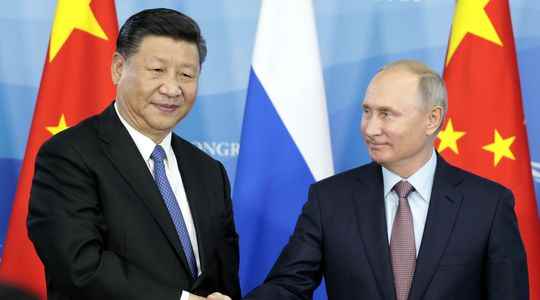The master of the Kremlin and his “great friend” Xi Jinping will have spent three long hours together before issuing a “joint statement on the entry of international affairs into a new era”. If Ukraine was not mentioned directly, it was on everyone’s mind. “No ground is forbidden to our cooperation”, wrote the two men in their manifesto, united in the denunciation of Western democracies.
The two countries concluded on this occasion about fifteen commercial agreements including the delivery by Rosneft and Gazprom of Russian gas and oil to China for an amount estimated at 117 billion dollars. This new agreement is in addition to the contract of the century signed in 2014, just two months after the annexation of Crimea by Russian troops and which amounted to 400 billion dollars over thirty years.
The very day the war broke out the Chinese customs authorities allowed the import of wheat from all Russian territories. A salutary breath of fresh air for Russia hit by Western sanctions. “China is ready to help Russia keep its economy afloat,” said Lu Xiang, a researcher at the Beijing Academy of Social Sciences. China has not condemned Moscow for its military intervention in Ukraine, it even says it “understands Russia’s legitimate concerns for its security” and refuses to speak of an invasion opposing any sanction.
China said “no” to an enlargement of NATO and a few days before the Russian military intervention, Wang Yi, Chinese Minister of Foreign Affairs declared: “The cold war is long over and NATO is the result of the cold war it must adapt to the times. Would the expansion of NATO to the East be conducive to the maintenance of peace and lasting stability in Europe? This is a question to which our friends Europeans need to think seriously”.
But it is above all the United States, accused of throwing oil on the fire, that are in China’s sights, as this editorial published by the daily GlobalTimes, mouthpiece of the Communist Party. By defending Russian interests vis-à-vis NATO, the Chinese leaders are perhaps hoping for a return of favor because China sees in the defense of Taiwan by the West the same policy of interference of which Russia accuses the European Union in Ukraine. “Beijing assumes that Russia will do the same when China finds itself in a critical security situation,” explains Richard Ghiasy, a specialist in Asian geopolitics at the HCSS cabinet.
A “provocative” gesture
China could even take advantage of the Ukrainian crisis to try a “provocative” gesture in Asia, believes for his part General Wilsbach, Commander of the American air forces in the Pacific. Taiwan, the island that Beijing has never given up on recovering, is on everyone’s mind. As the Russian tanks entered Ukraine, about ten Chinese fighters entered the Taiwanese air defense identification zone. “Beijing could give the Ukraine crisis the value of a test of the determination of the Biden administration in the event of a crisis with Taiwan”, observes Bonny Lin, of the Center for Strategic and International Studies in Washington.
“On the one hand, Beijing wants to develop its strategic relations with Russia; on the other, it would like to stabilize its relations with the United States and maintain its ties with the EU. It is a real dilemma. States and EU member countries come to see Beijing as an accomplice to Russian aggression against Ukraine, China could pay a heavy price,” said Adam Ni, editor of Neican, a newsletter on China. Reason why Beijing has not yet decided in favor of a brutal break with the West. On the one hand the country needs globalization and has built its economy on trade, on the other hand China has important interests in Ukraine.
Last June it signed a series of agreements with Ukraine linking it to the program of the “new silk roads”. With the key to a series of contracts for the construction of infrastructure in Ukraine and agricultural exports multiplied by three to China. Beijing even leases arable land, 3 million hectares or 5% of Ukrainian territory leased since 2013 by the state conglomerate XPPC for 50 years to grow wheat for the Middle Kingdom.
